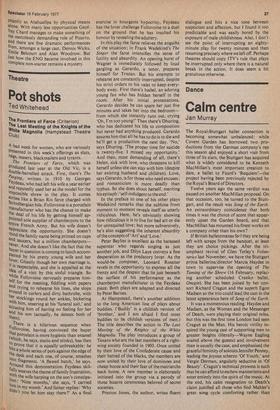Theatre
Pot shots
Ted Whitehead
The Frontiers of Farce (Criterion) The Last Meeting of the Knights of the White Magnolia (Hampstead Theatre Club) A bad week for women, who are variously Presented in this week's offerings as sluts, nags, teasers, blackmailers and tyrants.
The Frontiers of Farce, which was i Produced last year at the Old Vic, s a double-barrelled attack. First, there's The Plirging, written in 1910 by Georges L reYdeau, who had left his wife a year earlier and reputedly used her as the model for the impossible shrew in the play. It comes across like a Brian Rix farce charged with Strindbergian bile. Follovoine is a porcelain manufacturer who has the chance to make the deal of his life by getting himself appointed sole supplier of chamberpots to the entire French Army. But his wife doesn't appreciate the opportunity. She doesn't mind the family name being printed on cups and saucers, but a million chamberpotsnever. And she doesn't like the fact that the buyer in question is coming to lunch accomranted by his pretty young wife and her .over. Ghastly though her own marriage is, !t is respectable, and she is appalled at the idea of a visit by this sinful triangle. So vhile Follovoine nervously prepares himself for the meeting, fiddling with papers and trying to rehearse his lines, she slops around in curlers and dirty bathrobe, with her stockings round her ankles, bickering with him, sneering at his 'funeral suit,' and accusing him of having no feeling for her and his son (actually, he detests both of them).
There is a hilarious sequence when Follovoine, having convinced the buyer hat Porcelain is more hygienic than enamel kwhich, he says, stains and stinks), has then tO prove that it is equally unbreakable: he its a whole series of pots against the edge of the desk and each one, of course, smashes into fragments. 'A flawed batch,' he says. Around this demonstration Feydeau weaves the theme of family frustration, With the wife harping on the son's constipat,lon: 'Nine months,' she says, 'I carried u!ro in my womb.' And father replies: 'Why didn't you let him stay there?' As a final
exercise in bourgeois hypocrisy, Feydeau has the lover challenge Follovoine to a duel on the ground that he has insulted his honour by revealing the adultery.
In this play the farce relieves the anguihs of the situation ; in Frank Wedekind's The Singer the farce intensifies the sense of futility and absurdity. An opening burst of Wagner is immediately followed by loud gargling as Gerardo, a tenor, prepares himself for Tristan. But his attempts to rehearse are constantly interrupted, despite his strict orders to his valet to keep everybody away. First there's Isabel, an adoring young fan who has hidden herself in the room. After his initial protestations, Gerardo decides he can spare her just five minutes and takes her into the bedroom— from which she instantly runs out, crying 'Oh, I'm too young!' Then there's Dhuring, who has dedicated his life to composition but never had anything produced. Gerardo assures him that all he has to do is to die and he'll get a production the next day. 'No,' says Dhuring. 'The proper time for suicide is twenty-five. I missed my opportunity.' And then, most demanding of all, there's Helen, sick with love, who threatens to kill herself unless she can stay with him (despite her existing husband and children). Love, says Gerardo, is for those who need excuses; and romanticism is more deadly than typhus. So she does shoot herself, meriting his epitaph : 'self-indulgent to the end.'
In the preface to one of his other plays Wedekind remarks that the sublime from moment to moment reveals itself as utterly ridiculous. Here, he's obviously showing how ridiculous it is to live for bad art or die for unrequited love; but more subversively, he's also suggesting the inherent absurdity of the concepts of 'Art' and 'Love.'
Peter Bayliss is excellent as the harassed superstar who regards singing as just another job, and Dilys Laye conveys a fine desperation as the predatory lover. As the would-be composer, Leonard Rossiter revels in the opportunity to express all the frenzy and the despair that lie just beneath the surface of his performance as the chamberpot manufacturer in the Feydeau piece. Both plays are adapted and directed by Peter Barnes.
At Hampstead, there's another addition to the long American line of plays about buddies. ('Buddy' is a childish version of 'brother,' and I am afraid I find most buddies to be childish versions of men.) The title describes the action in The Last Meeting of the Knights of the White Magnolia. The play introduces a group of Texans who are the last members of a rightwing society founded in 1903. Once united
by their love of the Confederate cause and their hatred of the blacks, the members are now united by their love of dominoes and cheap booze and their fear of the matriarchs back home. A new member is elaborately initiated into the group via a parody of those bizarre ceremonies beloved of secret societies.
Preston Jones, the author, writes fluent dialogue and hits a nice tone between scepticism and affection, but I found it too predictable and was easily bored by the exposure of male childishness. Also, I don't see the point of interrupting an eightyminute play for twenty minutes and then resuming precisely where we left off. Perhaps theatres should copy ITV's rule that plays be interrupted only where there is a natural break in the action. It does seem a bit gratuitous otherwise.


































 Previous page
Previous page